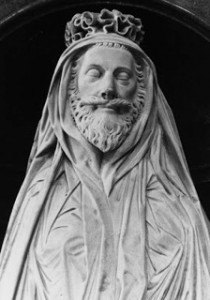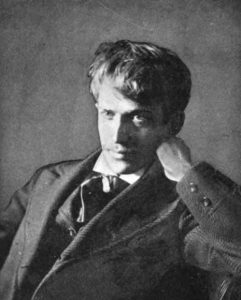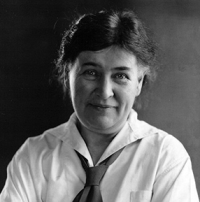Fleurs du Mal Magazine


Or see the index

The Rising Sun
Busy old fool, unruly Sun,
Why dost thou thus,
Through windows, and through curtains, call on us ?
Must to thy motions lovers’ seasons run ?
Saucy pedantic wretch, go chide
Late school-boys and sour prentices,
Go tell court-huntsmen that the king will ride,
Call country ants to harvest offices ;
Love, all alike, no season knows nor clime,
Nor hours, days, months, which are the rags of time.
Thy beams so reverend, and strong
Why shouldst thou think ?
I could eclipse and cloud them with a wink,
But that I would not lose her sight so long.
If her eyes have not blinded thine,
Look, and to-morrow late tell me,
Whether both th’ Indias of spice and mine
Be where thou left’st them, or lie here with me.
Ask for those kings whom thou saw’st yesterday,
And thou shalt hear, “All here in one bed lay.”
She’s all states, and all princes I ;
Nothing else is ;
Princes do but play us ; compared to this,
All honour’s mimic, all wealth alchemy.
Thou, Sun, art half as happy as we,
In that the world’s contracted thus ;
Thine age asks ease, and since thy duties be
To warm the world, that’s done in warming us.
Shine here to us, and thou art everywhere ;
This bed thy center is, these walls thy sphere.
John Donne
(1572–1631)
The Rising Sun
• fleursdumal.nl magazine
More in: Archive C-D, Archive C-D, Donne, John

The Ecstasy
Where, like a pillow on a bed
A pregnant bank swell’d up to rest
The violet’s reclining head,
Sat we two, one another’s best.
Our hands were firmly cemented
With a fast balm, which thence did spring;
Our eye-beams twisted, and did thread
Our eyes upon one double string;
So to’intergraft our hands, as yet
Was all the means to make us one,
And pictures in our eyes to get
Was all our propagation.
As ‘twixt two equal armies fate
Suspends uncertain victory,
Our souls (which to advance their state
Were gone out) hung ‘twixt her and me.
And whilst our souls negotiate there,
We like sepulchral statues lay;
All day, the same our postures were,
And we said nothing, all the day.
If any, so by love refin’d
That he soul’s language understood,
And by good love were grown all mind,
Within convenient distance stood,
He (though he knew not which soul spake,
Because both meant, both spake the same)
Might thence a new concoction take
And part far purer than he came.
This ecstasy doth unperplex,
We said, and tell us what we love;
We see by this it was not sex,
We see we saw not what did move;
But as all several souls contain
Mixture of things, they know not what,
Love these mix’d souls doth mix again
And makes both one, each this and that.
A single violet transplant,
The strength, the colour, and the size,
(All which before was poor and scant)
Redoubles still, and multiplies.
When love with one another so
Interinanimates two souls,
That abler soul, which thence doth flow,
Defects of loneliness controls.
We then, who are this new soul, know
Of what we are compos’d and made,
For th’ atomies of which we grow
Are souls, whom no change can invade.
But oh alas, so long, so far,
Our bodies why do we forbear?
They’are ours, though they’are not we; we are
The intelligences, they the spheres.
We owe them thanks, because they thus
Did us, to us, at first convey,
Yielded their senses’ force to us,
Nor are dross to us, but allay.
On man heaven’s influence works not so,
But that it first imprints the air;
So soul into the soul may flow,
Though it to body first repair.
As our blood labors to beget
Spirits, as like souls as it can,
Because such fingers need to knit
That subtle knot which makes us man,
So must pure lovers’ souls descend
T’ affections, and to faculties,
Which sense may reach and apprehend,
Else a great prince in prison lies.
To’our bodies turn we then, that so
Weak men on love reveal’d may look;
Love’s mysteries in souls do grow,
But yet the body is his book.
And if some lover, such as we,
Have heard this dialogue of one,
Let him still mark us, he shall see
Small change, when we’are to bodies gone.
John Donne
(1572–1631)
The Ecstasy
• fleursdumal.nl magazine
More in: Archive C-D, Archive C-D, Donne, John

Fame is a bee
Fame is a bee.
It has a song—
It has a sting—
Ah, too, it has a wing.
Emily Dickinson
(1830-1886)
Fame is a bee (1788)
• fleursdumal.nl magazine
More in: Archive C-D, Archive C-D, Dickinson, Emily

How to Kill
Under the parabola of a ball,
a child turning into a man,
I looked into the air too long.
The ball fell in my hand, it sang
in the closed fist: Open Open
Behold a gift designed to kill.
Now in my dial of glass appears
the soldier who is going to die.
He smiles, and moves about in ways
his mother knows, habits of his.
The wires touch his face: I cry
NOW. Death, like a familiar, hears
and look, has made a man of dust
of a man of flesh. This sorcery
I do. Being damned, I am amused
to see the centre of love diffused
and the wave of love travel into vacancy.
How easy it is to make a ghost.
The weightless mosquito touches
her tiny shadow on the stone,
and with how like, how infinite
a lightness, man and shadow meet.
They fuse. A shadow is a man
when the mosquito death approaches.
Keith Douglas
(1920 – 1944)
How to Kill
• fleursdumal.nl magazine
More in: Archive C-D, Archive C-D, Douglas, Keith, WAR & PEACE

Much Madness is divinest Sense
Much Madness is divinest Sense
To a discerning Eye –
Much Sense – the starkest Madness –
’Tis the Majority
In this, as all, prevail –
Assent – and you are sane –
Demur – you’re straightway dangerous –
And handled with a Chain –
Emily Dickinson
(1830-1886)
Much Madness is divinest Sense
• fleursdumal.nl magazine
More in: Archive C-D, Archive C-D, Dickinson, Emily

Death
A spirit sped
Through spaces of night;
And as he sped, he called,
“God! God!”
He went through valleys
Of black death-slime,
Ever calling,
“God! God!”
Their echoes
From crevice and cavern
Mocked him:
“God! God! God!”
Fleetly into the plains of space
He went, ever calling,
“God! God!”
Eventually, then, he screamed,
Mad in denial,
“Ah, there is no God!”
A swift hand,
A sword from the sky,
Smote him,
And he was dead.
Stephen Crane
(1871 – 1900)
Death. A spirit sped
•fleursdumal.nl magazine
More in: *War Poetry Archive, Archive C-D, Archive C-D, Stephen Crane

Song:
Sweetest love, I do not go
Sweetest love, I do not go,
For weariness of thee,
Nor in hope the world can show
A fitter love for me;
But since that I
Must die at last, ’tis best
To use myself in jest
Thus by feign’d deaths to die.
Yesternight the sun went hence,
And yet is here today;
He hath no desire nor sense,
Nor half so short a way:
Then fear not me,
But believe that I shall make
Speedier journeys, since I take
More wings and spurs than he.
O how feeble is man’s power,
That if good fortune fall,
Cannot add another hour,
Nor a lost hour recall!
But come bad chance,
And we join to’it our strength,
And we teach it art and length,
Itself o’er us to’advance.
When thou sigh’st, thou sigh’st not wind,
But sigh’st my soul away;
When thou weep’st, unkindly kind,
My life’s blood doth decay.
It cannot be
That thou lov’st me, as thou say’st,
If in thine my life thou waste,
That art the best of me.
Let not thy divining heart
Forethink me any ill;
Destiny may take thy part,
And may thy fears fulfil;
But think that we
Are but turn’d aside to sleep;
They who one another keep
Alive, ne’er parted be.
John Donne
(1572–1631)
Song: Sweetest love, I do not go
• fleursdumal.nl magazine
More in: Archive C-D, Archive C-D, Donne, John
« Je voulais raconter ça, l’histoire d’une famille de pasteurs qui perd la mémoire. Traiter d’un drame, avec le plus de lumière possible. » 〈Emma Doude van Troostwijk〉
Le temps d’un séjour de quelques semaines dans sa maison d’enfance, la narratrice raconte ses retrouvailles avec sa famille, où, depuis trois générations, hommes et femmes ont choisi le métier de pasteur. Mais quand elle arrive, quelque chose de cet ordre ancien s’est profondément déréglé.
 Plongez, grâce à ce subtil premier roman, dans l’atmosphère enveloppante et mystérieuse d’un presbytère. Un premier roman aux charmes puissants, tout en clair-obscur, serti de détails lumineux. Un livre bouleversant sur la mémoire, l’oubli et la puissance de la narration – pour retisser du lien.
Plongez, grâce à ce subtil premier roman, dans l’atmosphère enveloppante et mystérieuse d’un presbytère. Un premier roman aux charmes puissants, tout en clair-obscur, serti de détails lumineux. Un livre bouleversant sur la mémoire, l’oubli et la puissance de la narration – pour retisser du lien.
Une grande découverte ! 〈Gallimard〉
Emma Doude van Troostwijk écrit un premier roman éminemment original. Son originalité est à la fois narrative et formelle. L’histoire est sombre, pourtant ceux qui la vivent restent libres. 〈Le Monde〉
Ceux qui appartiennent au jour
par Emma Doude Van Troostwijk
Roman Francais
Date de parution: 2 Janvier 2024
Éditions Minuit
EAN 9782707349484
Nombre de pages: 176
Longueur 18.5 cm
Largeur 13.5 cm
Épaisseur 1.5 cm
Broché
€ 17.00
• fleursdumal.nl magazine
More in: - Book Lovers, - Book News, - Bookstores, Archive C-D, Archive S-T, Art & Literature News, Emma Doude Van Troostwijk

Woman’s Constancy
Now thou has loved me one whole day,
Tomorrow when you leav’st, what wilt thou say?
Wilt thou then antedate some new-made vow?
Or say that now
We are not just those persons which we were?
Or, that oaths made in reverential fear
Of Love, and his wrath, any may forswear?
Or, as true deaths true marriages untie,
So lovers’ contracts, images of those,
Bind but till sleep, death’s image, them unloose?
Or, your own end to justify,
For having purposed change and falsehood, you
Can have no way but falsehood to be true?
Vain lunatic, against these ‘scapes I could
Dispute and conquer, if I would,
Which I abstain to do,
For by tomorrow, I may think so too.
John Donne
(1572–1631)
Woman’s Constancy
• fleursdumal.nl magazine
More in: Archive C-D, Archive C-D, Donne, John

I Sought the Wood in Winter
I sought the wood in summer
When every twig was green;
The rudest boughs were tender,
And buds were pink between.
Light-fingered aspens trembled
In fitful sun and shade,
And daffodils were golden
In every starry glade.
The brook sang like a robin—
My hand could check him where
The lissome maiden willows
Shook out their yellow hair.
“How frail a thing is Beauty,”
I said, “when every breath
She gives the vagrant summer
But swifter woos her death.
For this the star dust troubles,
For this have ages rolled:
To deck the wood for bridal
And slay her with the cold.”
I sought the wood in winter
When every leaf was dead;
Behind the wind-whipped branches
The winter sun set red.
The coldest star was rising
To greet that bitter air,
The oaks were writhen giants;
Nor bud nor bloom was there.
The birches, white and slender,
In deathless marble stood,
The brook, a white immortal,
Slept silent in the wood.
“How sure a thing is Beauty,”
I cried. “No bolt can slay,
No wave nor shock despoil her,
No ravishers dismay.
Her warriors are the angels
That cherish from afar,
Her warders people Heaven
And watch from every star.
The granite hills are slighter,
The sea more like to fail;
Behind the rose the planet,
The Law behind the veil.”
Willa Cather
(1873 – 1947)
I Sought the Wood in Winter
• fleursdumal.nl magazine
More in: # Classic Poetry Archive, 4SEASONS#Winter, Archive C-D, Archive C-D

Les quatre saisons – L’hiver
C’est l’hiver. Le charbon de terre
Flambe en ma chambre solitaire.
La neige tombe sur les toits.
Blanche ! Oh, ses beaux seins blancs et froids!
Même sillage aux cheminées
Qu’en ses tresses disséminées.
Au bal, chacun jette, poli,
Les mots féroces de l’oubli,
L’eau qui chantait s’est prise en glace,
Amour, quel ennui te remplace!
Charles Cros
(1842 – 1888)
Les quatre saisons – L’hiver
• fleursdumal.nl magazine
More in: 4SEASONS#Winter, Archive C-D, Archive C-D, Cros, Charles

Vergissmeinnicht
(Forget-me-not))
Three weeks gone and the combatants gone
returning over the nightmare ground
we found the place again, and found
the soldier sprawling in the sun.
The frowning barrel of his gun
overshadowing. As we came on
that day, he hit my tank with one
like the entry of a demon.
Look. Here in the gunpit spoil
the dishonoured picture of his girl
who has put: Steffi. Vergissmeinnicht.
in a copybook gothic script.
We see him almost with content,
abased, and seeming to have paid
and mocked at by his own equipment
that’s hard and good when he’s decayed.
But she would weep to see today
how on his skin the swart flies move;
the dust upon the paper eye
and the burst stomach like a cave.
For here the lover and killer are mingled
who had one body and one heart.
And death who had the soldier singled
has done the lover mortal hurt.
Keith Douglas
(1920 – 1944)
Vergissmeinnicht (Forget-me-not)
• fleursdumal.nl magazine
More in: Archive C-D, Archive C-D, Douglas, Keith, WAR & PEACE
Thank you for reading Fleurs du Mal - magazine for art & literature